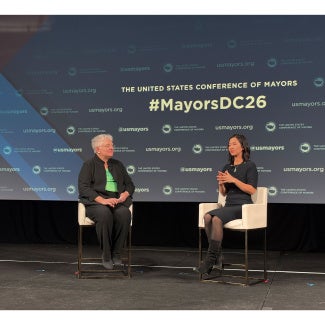AIA awards research grants to advance climate action
Upjohn Research Initiative supports AIA's commitment to climate action by awarding grants to sustainable design research.

WASHINGTON – July 10, 2025– The American Institute of Architects (AIA) Upjohn Research Initiative is providing up to $30,000 to four research projects that will advance sustainability in architecture.
The purpose of the grant is to provide base funds for applied research projects that will advance the design profession’s knowledge and practice. This year’s recipients will research building materials and climate focused infrastructure for public spaces. Grant recipients were selected by a seven-member jury comprised of members from the AIA College of Fellows and AIA Board Knowledge Committee.
This year’s selected Upjohn Research Initiative projects include:
Algae Foam: Prototype for Buildings
Principal Investigators: Martin Bechthold, DDes and Daniel Tish, DDes
Algae Foam: Prototype for Buildings project aims to develop a thermal insulation material with a low-to-negative carbon footprint by using microalgae grown in nutrient recovery systems that treat effluents, sequester CO2, and generate biomass. It aligns with the AIA Framework for Design Excellence, focusing on 'Design for Resources,' 'Design for Ecosystems,' and 'Design for Water.' The project aligns with this year's "Zero-Carbon" initiative, as it offers an alternative to conventional insulation materials that help to reduce operational emissions primarily caused by heating and cooling.
Integrated Carbon Dashboard for Residential Architecture
Principal Investigators: Vikram Sami, AIA, LEED AP, BEMP, Teresa Moroseos AIA, Christopher Savage, PhD, LEED AP BD+C, Christopher Meek, FAIA, Heather Burpee, Assoc. AIA, Pawel Sapiecha
The Integrated Carbon Dashboard for Residential Architecture's goal is to develop a free, user-friendly tool that will guide smaller firms, comprising around 60 percent of AIA member firms, towards carbon neutrality in building projects. This tool targets residential architecture, which makes up 70 percent of the U.S. building stock. Although architects do not design many single-family homes, researchers believe this tool will help designers working on such housing stock achieve their goals. The project aligns with the "Zero-Carbon" initiative by promoting low-carbon design and educating small-firm architects and professionals. It also encourages "Practice Innovation" by integrating early design workflows and enhancing existing tools, such as connecting the "Materials" and "Energy" sections of the AIA Common App.
Masonry Material Recovery: Building Disassembly and Remanufacture for the Circular Economy
Principal Investigator: Dillon Pranger, AIA (Illinois Institute of Technology)
Collaborators: Steve Filyo (BlueEarth Deconstruction), Matt Gombeda (Illinois Institute of Technology), Scott Conwell, FAIA, FCSI, CDT, LEED AP (International Masonry Institute)
Masonry Material Recovery is a multi-disciplinary investigation aimed at reducing material and energy consumption in the built environment through the development of novel approaches to the reclamation of demolished masonry elements, specifically concrete masonry units (CMU), brick, and stone materials. The project team will use emerging technologies such as 3D scanning, digital twin modeling, and augmented reality to design and test new workflows that consider each phase of a material’s typical journey from recovery, to remanufacturing, design, and ‘new’ construction. The project seeks to reduce reliance on virgin resources, decrease energy and carbon emissions, and set new standards for sustainable construction practices.
OPEN-GROUND: Public Space as Climate Infrastructure
Principal Investigators: Daniel Jacobs RA (University of Houston), Brittany Utting RA (Rice University)
OPEN-GROUND is a design proposal and research experiment that studies how public architecture can operate as both climate infrastructure and a space for outdoor leisure. The project adapts Houston’s typologies of urban public space, such as the shaded sport court, into microclimatic engines, exploring the integration of water catchment reservoirs with passive cooling techniques. The grant will fund an integrated design process including physical models, digital simulations, and experimental mock-ups to study the thermodynamic and material properties of the proposal. Demonstration prototypes will be publicly exhibited and documented alongside a publication.
View past recipients of the Upjohn Research Initiative.
Complete our form to submit a press inquiry or speaking request.
Follow AIA on LinkedIn



